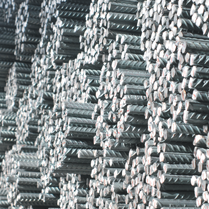Steel Reinforcements Bars or Rebars are used as a tension device to improve the tensile strength of the concrete. This is because concrete is sufficiently strong to compression forces by nature, but tension forces can crack it.
The rebar fundamentally expands the elasticity of the concrete structure. The surface of the reinforcement steel is regularly warped with ribs, spaces to advance a superior bond with the solid concrete and diminish the danger of slippage.
Reinforcing bars are hot-rolled using different steel materials. Most rebars are rolled from new steel billets, but others are rolled from steel debris or railroad rails.
Types of Rebar— Major types of steel bars used in the construction industry are as follows:
Deformed Steel Bar: The most common form of steel rebar, deformed steel bars are primarily used to reinforce steel sections that have been encased in concrete. Along with having high tensile strength, these bars are very flexible and easy to weld and maintain.
Mild Steel Bar: Mild Steel Bars are a great fit for lighter and smaller types of construction projects. They are plain, round in shape, and smaller in size. Very easy to cut and bend, making it easy to install and use for columns and road projects.
European Rebar: This is comparatively a low-cost option. They are made out of manganese, which gives them flexibility. However, these bars are not susceptible to withstand natural phenomena like earthquakes and hurricanes. These bars are a good option in terms of affordability and smaller projects.
Carbon Steel Rebar: These bars are highly used for a variety of reasons. They are— durable, light, and flexible, making them excellent choices for different kinds of construction projects. Their only drawback is that they are prone to corrosion, highly requiring constant maintenance.
Epoxy Coated Rebar: This rebar is your best bet at protecting your structure from corrosion. An Epoxy Rebar is your standard bar that is reinforced in the epoxy coating, making it highly resistant to different types of corrosion
Galvanized Rebar: This rebar is used for bigger and heavier projects as it provides the best protection from corrosion, natural events and is difficult to damage. They are also an expensive option.
Stainless Steel Rebar: This is the most expensive rebar option. They are a great option for both outdoor projects and exposed areas as they are resistant to corrosion and other various elements. They are also very flexible and resistant to high temperatures as well, making them great for industrial areas.
Gulf Steel is a Reinforcement Steel Bar supplier in Abu Dhabi. The production facilities located at Musaffah, Abu Dhabi manufactures Reinforcement Steel Bars/Cold-Ribbed Bars in Coils and Cut-to-Length sizes and Welded Mesh. Led by a strong management team, the company has focused on technological excellence geared towards the production of high-quality steel products.

